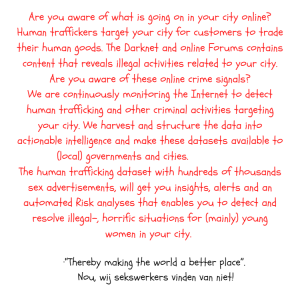Webscraping
What is it?
Web crawling is the use of software that "crawls" (searches) the Internet. For example, Google also uses it to map out what websites are out there.
And with web scraping, information is then "scraped" from a website. That information is then organized and analyzed again in a database. This is done in an automated way.
What can it mean for a sex worker?
The company WebiqQ is taking down ads from all sex work ad platforms through web crawling/ web scraping. They have called this project Safe City. They offer the information to municipalities. We know that e.g. Groningen, Rotterdam, Utrecht, Almere, Leeuwarden, and Den Haag are working with it. Ede is said to have dropped out. They have collected 1.2 million images from 25 sex work ad platforms. The chances are very high that they apply facial recognition to those. In addition, they collected 260,000 ads, and 31,000 phone numbers. It is sold under the banner of combating human trafficking, but in practice it is mainly used to track down unlicensed sex workers working from home, to fine them and/or to evict them from their homes. WebiQ is probably not the only provider or municipalities have built their own web crawler. Presumably also the municipality of Amsterdam.
You can be absolutely sure that when you advertise that your data is in their hands and has been sold on to interested parties. In addition to municipalities also to police, Ministry of Justice, the Public Prosecutor and Interpol.
They call it an "anonymous dataset. It involves data such as a work name, a work phone and a work email address . But this data can still often be traced to a physical person with a real name and address. And of course with photos attached. The system can also track the travel movements of one person, and provide print screens of that person to the municipality or police. So there is very little anonymity there.
What the system is also good at is paying attention to the wallpaper in the background. Looking up there, you suddenly see, say, five women photographed with that same wallpaper in a hotel room. And that is seen as an indication of human trafficking.
They identify the following abuses:
- Coercion through exploitation
- Minority
- Coercion by economic conditions (!)
- Illegal prostitution and supervision of businesses
And they created high-risk filter with the following risk scores:
- Low age
- Extreme possibilities
- Foreign Languages
- High availability
- Low price
Web scrapping is not in itself illegal; the data are publicly available on the Internet. After all, a sex worker also advertises in public. But if you use it to create a new database containing special personal data, you have to get permission from the AP, the Personal Data Authority. And that permission is not there. And what is also annoying is that if a sex worker removes an advertisement it still remains findable in the system.
The company doing this poses rather secretively, and there was supposed to be a meeting with a sex workers' organization at one point, but it did not happen. The website about the Safe City project was taken offline.

What can you do?
Sigh deep? It has been denounced a number of times, including by organizations that stand up for our (digital) freedoms, but this doesn't seem to get much priority.
As someone tweeted: "Everyone is against human trafficking, only proportionality in the approach should be paramount. No one is served by a database that contains 3 victims and 1000 sex workers. And also violating the privacy of those three victims makes it anything but better for them."
Another deep sigh.
Continue reading
https://www.dataexpert.nl/en/products/osint-plug-ins-web-iq/safecity-platform/
